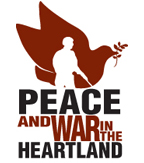OnStage: Still no peace
By GRAYDON ROYCE, Star Tribune
February 22, 2008
Ron Peluso received the letter shortly after an early version
of "The Minnesota 8" was read at the History Theatre's
Raw Stages series in 2005. A patron wrote that she would never
again set foot inside the St. Paul theater, so offensive was
the drama based on Vietnam War protesters who had raided draft
boards across the state. She had been a secretary in the St.
Paul office and felt terrorized by the 1970 event.
Peluso, the History Theatre's artistic director, assured the
woman that the play was still in development. He passed along
the note to playwright Doris Baizley, who was called in after
Raw Stages to take over the script, originally by a different
playwright.
"We get a little of the secretary's point of view now,"
said Peluso, who indicated he's uncertain whether she'll come
back for a look at "Peace Crimes: The Minnesota Eight vs.
The War," as the play is now titled. "This one sparks
really angry discussion on both sides. It feels like one of
the more important things we've done."
It opens tonight in a premiere collaboration with the University
of Minnesota's Theater Department at Rarig Center in Minneapolis.
Daniel Ellsberg, of Pentagon Papers fame and a witness at the
Minnesota 8 trial, is expected to see the show Saturday and
speak in a University Great Conversations event next Tuesday
(612-624-2345 for information).
A full generation has grown up since Vietnam raged in the public
consciousness and still the war rests uneasily. The U.S. occupation
of Iraq has raised its currency on both sides. Vietnam teaches
us what happens when we cut and run, advocates say. Vietnam
teaches us what happens when we bumble our way through a misguided
military adventure, opponents reply.
Those, however, are geopolitical arguments. As the disgruntled
patron's unease indicates, Vietnam's wounds are personal --
a death of a friend, the trauma of being attacked for your beliefs,
a loss of faith in leaders we once trusted.
"The anger and the frustration in 1970 was immense and
it felt like we couldn't trust our government after that,"
said Baizley, a Los Angeles writer who marks her Twin Cities
stage debut with this play. "It changed the basic things
of my life and I felt since then that I've been much more suspicious
of government."
Breaking the social compact
Peluso first learned of Baizley after watching a PlayLabs
reading of her script "SexSting" in 2004. Impressed,
he thought of her when he was looking for a new writer to rework
the story of eight Minnesota men who were convicted of burglary
and spent between 14 and 20 months in prison after the break-ins
in 1970.
Baizley, though unfamiliar with
the case, had her own Vietnamexperience.
Three friends enlisted in 1966 and only one returned from Vietnam.
"Our generals were putting kids in danger in a really terrible
way that involved lying," she said. "Then we started
thinking that maybe the guys who are running this society don't
have our good at heart. That's why when Ron told me about the
Minnesota 8, something in my mind clicked right into it."
Baizley dove into her own antiwar
past -- letters from guys in Vietnam, speeches by a friend's
mother -- and also read the Minnesota court transcripts. She
saw the specifics of this case as a jumping-off point for a
wider exploration of the era, "more like a pageant or a
Diego Rivera mural."
Despite the risks of leaving
his St. Paul home base, Peluso felt the show should be produced
at the University of Minnesota. After all, the Minnesota 8 consisted
mostly of students, so who better to portray students than students?
"It allowed us to do the play as it's meant to be done,"
said Peluso.
For the youngsters, Vietnam is history and not the real experience
it was for Baizley and Peluso, who graduated from high school
in 1968 and qualified for a student deferment. They are receptive,
however, particularly given current events in Iraq. That willingness
might not have been there during the 1980s, when young people
grew tired of hearing about the Vietnam years.
"Kids were really sick of
hearing us talk about having the best music, the best protests
and I began to feel like an old jerk," said Baizley. "These
kids are enough younger and they are in their 20s with a war
going on, and an environmental crisis that has gotten them into
action and they're looking at us with more sympathy and interest."
Ironically, one of the "reforms"
of the Vietnam era has dampened today's protest movement. The
Minnesota 8 targeted Selective Service offices, and in 2008
there is no draft. Too, Vietnam was part of a nexus of protest
movements that created a counterculture synergy. Today, especially
with the Iraq war being framed as part of anti-terrorism efforts,
the public is given to a more ambiguous response. Pew Research
reported in November that a slight majority favored withdrawing
U.S. troops from Iraq; yet, the number of people who felt the
military effort was going well had risen 18 points to 48 percent
over the previous six months.
Lodged within those findings is the attempt by some to brand
antiwar activists as unpatriotic, a sensation that resonates
with the Vietnam era.
"The reason we're doing this play is that it's about peace,
protest and patriotism," said Peluso. "There is a
price you pay for speaking out. It's surprising how much we
haven't learned about the past."
Graydon Royce • 612-673-7299
© 2008 Star Tribune. All rights reserved.
|
